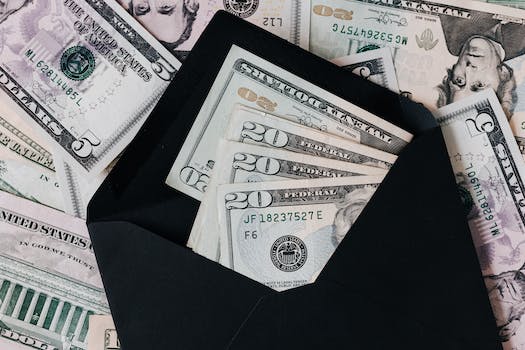How Much Money Should You Have Saved By 30
“Financial experts recommend having at least 1 year’s worth of salary saved by age 30.”
Introduction
By the age of 30, it is important to have a solid financial foundation in place. This includes having a certain amount of money saved up to ensure financial stability and security. The amount of money that should be saved by 30 varies depending on individual circumstances and financial goals.
The Importance of Saving Early: How to Reach Your Financial Goals by 30
As you approach your 30s, you may start to wonder how much money you should have saved by now. While there is no one-size-fits-all answer to this question, there are some general guidelines that can help you determine if you’re on track to reach your financial goals.
The Importance of Saving Early
One of the most important things you can do for your financial future is to start saving early. The earlier you start, the more time your money has to grow through compound interest. This means that even small contributions can add up over time and turn into a significant amount of money.
For example, if you start saving $100 per month at age 25 and earn an average annual return of 7%, you could have over $100,000 by age 50. However, if you wait until age 35 to start saving the same amount, you would only have around $50,000 by age 50.
How to Reach Your Financial Goals by 30
So, how much money should you have saved by 30? The answer depends on your individual financial goals and circumstances. However, there are some general guidelines that can help you determine if you’re on track.
One rule of thumb is to have saved at least one year’s worth of your salary by age 30. For example, if you earn $50,000 per year, you should aim to have saved at least $50,000 by age 30. This may seem like a daunting task, but remember that every little bit counts.
To reach this goal, you may need to make some sacrifices and cut back on unnecessary expenses. This could mean cooking at home instead of eating out, buying used instead of new, or finding ways to earn extra income through a side hustle.
Another important factor to consider is your debt. If you have high-interest debt, such as credit card debt or student loans, it’s important to prioritize paying off these debts before focusing on saving. This is because the interest on these debts can quickly add up and make it difficult to get ahead financially.
Once you have paid off your high-interest debt, you can start focusing on saving for your future. One way to do this is to set up automatic contributions to a retirement account, such as a 401(k) or IRA. This will help ensure that you are consistently saving for your future, even if you don’t have a lot of extra money to spare.
In addition to saving for retirement, it’s also important to have an emergency fund. This should be a separate account that you can access in case of unexpected expenses, such as a car repair or medical bill. Aim to have at least three to six months’ worth of living expenses saved in your emergency fund.
Final Thoughts
While there is no one-size-fits-all answer to how much money you should have saved by 30, there are some general guidelines that can help you determine if you’re on track to reach your financial goals. The most important thing is to start saving early and consistently, even if you can only afford to save a small amount each month. By making smart financial decisions and prioritizing your savings, you can set yourself up for a secure financial future.
Maximizing Your Income: Tips for Increasing Your Savings Potential

As you approach your 30s, you may start to wonder how much money you should have saved by now. While there is no one-size-fits-all answer to this question, there are some general guidelines that can help you determine if you’re on track.
First and foremost, it’s important to remember that everyone’s financial situation is different. Factors such as your income, expenses, and debt can all impact how much money you’re able to save. That being said, a good rule of thumb is to aim to have at least three to six months’ worth of living expenses saved in an emergency fund by the time you turn 30.
An emergency fund is a crucial component of any financial plan. It can help you weather unexpected expenses, such as a car repair or medical bill, without having to rely on credit cards or loans. Ideally, your emergency fund should be kept in a separate savings account that is easily accessible in case of an emergency.
If you haven’t started saving for an emergency fund yet, don’t worry. It’s never too late to start. Begin by setting aside a small amount each month, even if it’s just $25 or $50. Over time, your emergency fund will grow, providing you with a safety net in case of unexpected expenses.
In addition to an emergency fund, it’s also important to start saving for retirement as early as possible. The earlier you start saving, the more time your money has to grow. Experts recommend saving at least 10% to 15% of your income for retirement, but again, this will depend on your individual financial situation.
If you have access to a 401(k) or other employer-sponsored retirement plan, take advantage of it. These plans often offer matching contributions from your employer, which can help boost your savings even further. If you don’t have access to an employer-sponsored plan, consider opening an individual retirement account (IRA) instead.
Another way to increase your savings potential is to look for ways to increase your income. This could mean asking for a raise at work, taking on a side hustle, or even starting your own business. The more money you’re able to bring in, the more you’ll be able to save.
Of course, increasing your income is easier said than done. It may require additional education or training, or it may mean taking on extra work outside of your regular job. However, the effort can be well worth it in the long run, as it can help you achieve your financial goals more quickly.
Finally, it’s important to be mindful of your spending habits. While it’s certainly okay to treat yourself every once in a while, it’s important to make sure that your spending aligns with your financial goals. This may mean cutting back on unnecessary expenses, such as eating out or buying new clothes, in order to free up more money for savings.
In conclusion, there is no one-size-fits-all answer to how much money you should have saved by 30. However, by aiming to have at least three to six months’ worth of living expenses saved in an emergency fund, saving for retirement, increasing your income, and being mindful of your spending habits, you can set yourself up for financial success in your 30s and beyond.
Creating a Realistic Budget: How to Save Money Without Sacrificing Your Lifestyle
As you approach your 30s, it’s natural to start thinking about your financial future. One of the most important questions you may be asking yourself is, “How much money should I have saved by 30?” While there’s no one-size-fits-all answer to this question, there are some general guidelines you can follow to ensure you’re on the right track.
First and foremost, it’s important to create a realistic budget. This means taking a hard look at your income and expenses and figuring out where you can cut back. While it may be tempting to splurge on the latest gadgets or go out to eat every night, these expenses can quickly add up and leave you with little to no savings.
One way to save money without sacrificing your lifestyle is to set a monthly budget for discretionary spending. This can include things like eating out, entertainment, and shopping. By setting a limit on these expenses, you’ll be forced to prioritize what’s truly important to you and avoid overspending.
Another way to save money is to automate your savings. This means setting up a direct deposit from your paycheck into a savings account. By doing this, you’ll be less likely to spend the money and more likely to build up your savings over time.
When it comes to how much money you should have saved by 30, experts recommend having at least three to six months’ worth of living expenses in an emergency fund. This can help you weather unexpected expenses like car repairs or medical bills without having to dip into your savings or go into debt.
In addition to your emergency fund, it’s also important to start saving for retirement as early as possible. While it may seem far off, the earlier you start saving, the more time your money has to grow. Experts recommend saving at least 10% to 15% of your income for retirement, but any amount is better than nothing.
If you’re struggling to save money, there are a few things you can do to make it easier. One is to track your expenses using a budgeting app or spreadsheet. This can help you identify areas where you’re overspending and make adjustments accordingly.
Another tip is to look for ways to increase your income. This can include taking on a side hustle or asking for a raise at work. By increasing your income, you’ll have more money to put towards savings and other financial goals.
Ultimately, the amount of money you should have saved by 30 depends on your individual circumstances. Factors like your income, expenses, and financial goals all play a role in determining how much you should be saving. However, by creating a realistic budget, automating your savings, and prioritizing your financial goals, you can set yourself up for a secure financial future.
Investing for the Future: Why You Should Start Now and How to Get Started
As you approach your 30s, you may start to wonder how much money you should have saved by now. While there is no one-size-fits-all answer to this question, there are some general guidelines that can help you determine if you’re on track for a secure financial future.
First and foremost, it’s important to understand why saving for the future is so important. Many people in their 20s and early 30s are focused on paying off student loans, buying a home, or starting a family. While these are all important goals, it’s also important to think about your long-term financial security.
One of the biggest reasons to start saving early is the power of compound interest. When you invest your money, you earn interest not only on your initial investment but also on the interest that your investment earns over time. This means that the earlier you start investing, the more time your money has to grow.
So, how much money should you have saved by 30? A general rule of thumb is to have saved the equivalent of your annual salary by this age. For example, if you earn $50,000 per year, you should aim to have $50,000 in savings by the time you turn 30.
Of course, this is just a guideline, and everyone’s financial situation is different. If you have significant student loan debt or other financial obligations, it may be more difficult to save this much by 30. However, it’s still important to make saving a priority and to start investing as early as possible.
If you’re not sure where to start with investing, there are a few key steps you can take. First, make sure you have an emergency fund in place. This should be enough to cover at least three to six months’ worth of living expenses in case of an unexpected job loss or other financial emergency.
Once you have an emergency fund, you can start thinking about investing for the future. One of the easiest ways to get started is to contribute to a retirement account, such as a 401(k) or IRA. These accounts offer tax benefits and can help you save for retirement over the long term.
If you’re not sure how to choose investments for your retirement account, consider working with a financial advisor. They can help you determine your risk tolerance and choose investments that align with your goals.
Another option for investing is to open a brokerage account and invest in individual stocks or mutual funds. This can be a more hands-on approach to investing, but it also requires more research and knowledge about the stock market.
No matter how you choose to invest, the most important thing is to start early and make saving a priority. By doing so, you can set yourself up for a secure financial future and enjoy the benefits of compound interest over time.
Preparing for Emergencies: How Much You Should Have Saved and How to Build Your Emergency Fund
As you approach your 30s, it’s important to start thinking about your financial future. One of the most important aspects of financial planning is preparing for emergencies. Unexpected expenses can arise at any time, and having an emergency fund can help you avoid financial stress and keep you on track towards your long-term goals.
So, how much money should you have saved by 30? Financial experts recommend having at least three to six months’ worth of living expenses saved in an emergency fund. This means that if your monthly expenses are $3,000, you should aim to have between $9,000 and $18,000 saved in your emergency fund.
Building an emergency fund can seem daunting, especially if you’re just starting out in your career. However, there are several strategies you can use to build your emergency fund over time.
First, start by setting a savings goal. Determine how much you need to save and set a timeline for achieving that goal. This will help you stay motivated and focused on building your emergency fund.
Next, look for ways to cut expenses and increase your savings. This could mean cutting back on discretionary spending, such as eating out or buying new clothes, or finding ways to reduce your monthly bills, such as negotiating a lower cable or internet bill.
Another strategy is to automate your savings. Set up a direct deposit from your paycheck into your emergency fund each month. This will help you build your savings without even thinking about it.
You can also consider using windfalls, such as tax refunds or bonuses, to boost your emergency fund. Instead of spending this extra money, put it directly into your emergency fund to help you reach your savings goal faster.
It’s important to remember that building an emergency fund is a process that takes time. Don’t get discouraged if you’re not able to save as much as you’d like right away. The key is to stay committed to your savings goal and make small changes over time to help you reach your target.
Once you’ve built your emergency fund, it’s important to keep it separate from your other savings and investments. This will help you avoid the temptation to dip into your emergency fund for non-emergency expenses.
You should also periodically review your emergency fund to make sure it’s still sufficient for your needs. If your expenses have increased or your income has decreased, you may need to adjust your savings goal accordingly.
In addition to building an emergency fund, it’s also important to have adequate insurance coverage. This includes health insurance, auto insurance, and renters or homeowners insurance. Having the right insurance can help protect you from financial losses in the event of an unexpected emergency.
In conclusion, preparing for emergencies is an important part of financial planning, especially as you approach your 30s. Aim to have at least three to six months’ worth of living expenses saved in an emergency fund, and use strategies such as setting a savings goal, cutting expenses, and automating your savings to help you reach your target. Remember to keep your emergency fund separate from your other savings and investments, and periodically review your savings goal to make sure it’s still sufficient for your needs. By taking these steps, you can help protect yourself from financial stress and stay on track towards your long-term goals.
Conclusion
It is recommended to have at least 3 times your annual salary saved by the age of 30. However, the amount of money you should have saved by 30 depends on your individual financial goals and circumstances. It is important to prioritize saving and investing early on to ensure financial stability in the future.





